When you try these Preserved Chillies in Oil, you will discover their versatility. In fact, such is their ability to add flavour to many dishes, you may in future decide to keep a jar of these on hand at all times. They are also super simple to prepare!
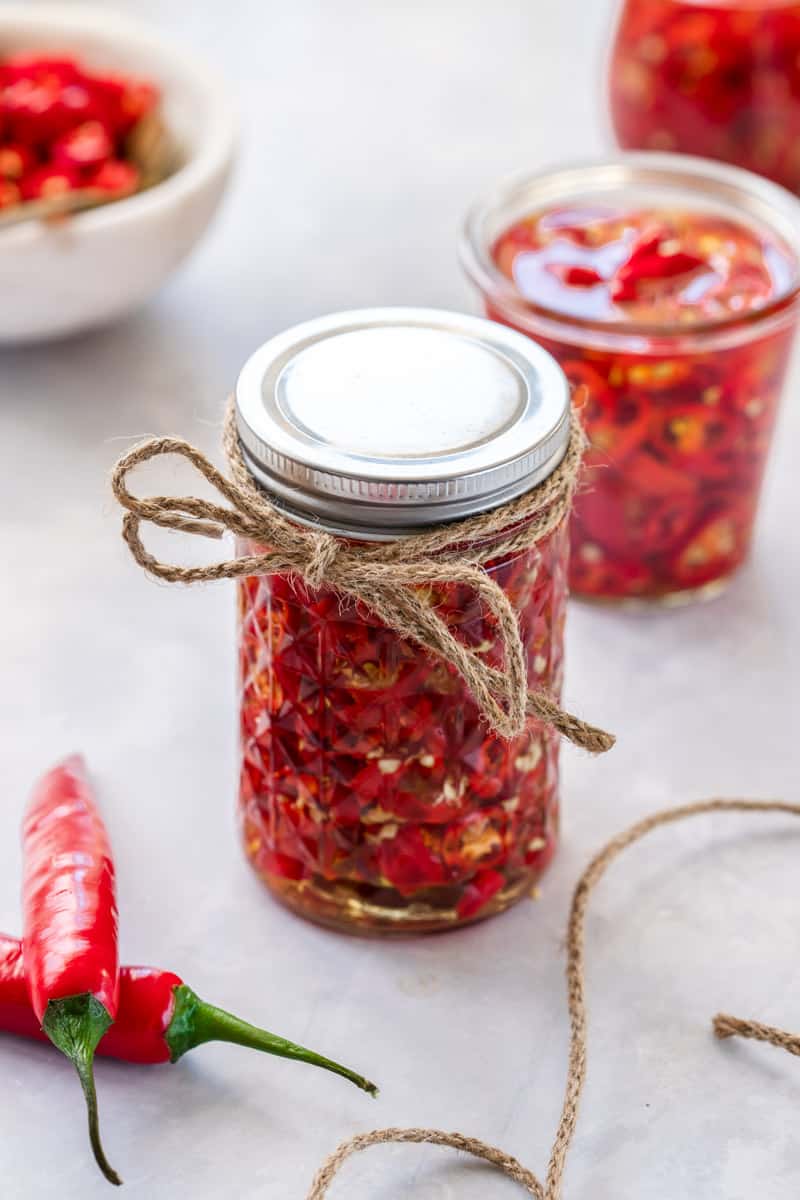
Jump to:
Why we love this recipe:
I have been making this recipe for many years. It originally came from the Italian owner of our favourite pizza restaurant. He had a personal jar of homemade preserved chillies which he brought to our table whenever we dined there. He was delighted that we enjoyed them as his family has been making this condiment for generations and shared with me the method to make them.
There was, of course, no actual recipe, just an outline of what they did, so I interpreted and adapted this and was delighted with the result.
This is a great condiment. I always have a jar on hand as they are perfect for people who like a little warmth with their meals. They are a good accompaniment to meats of all kind, poultry, pizza or pasta.
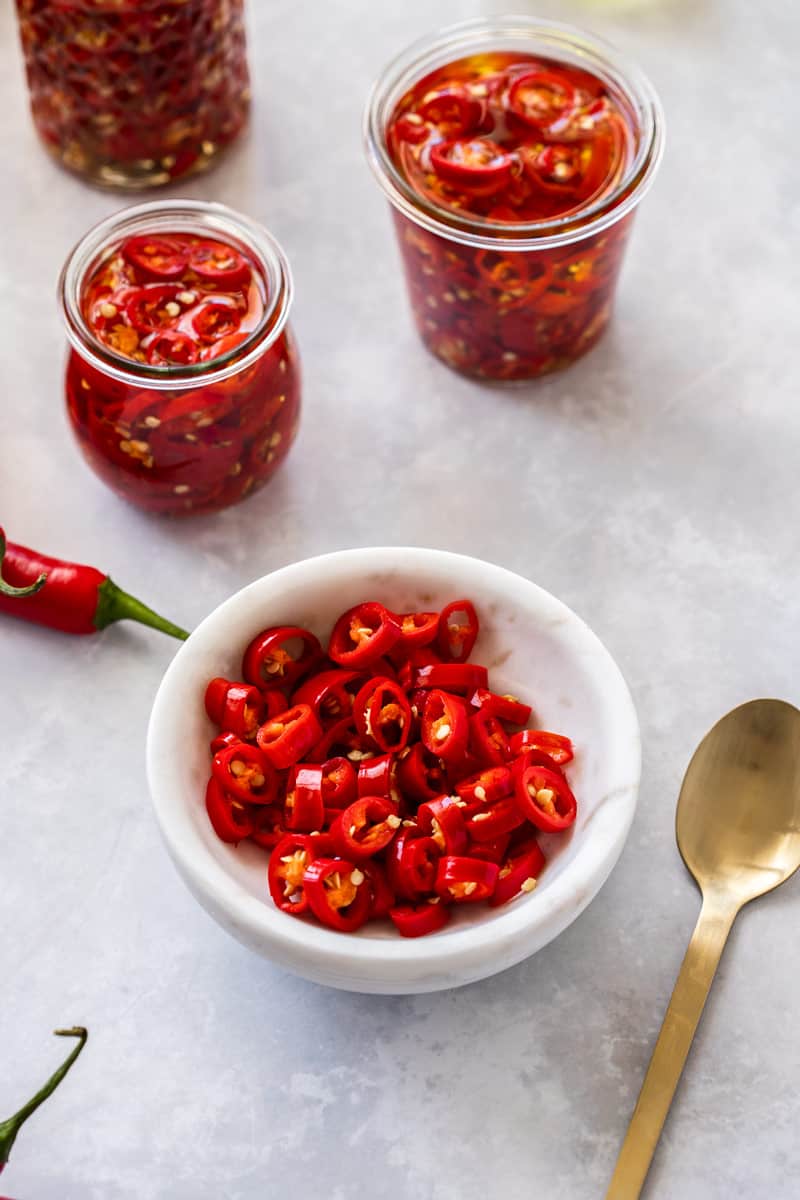
Ingredients in this recipe:
Long red chillies (cayenne chillies):
I use red cayenne chillies, they are the long, slender variety which generally have a deep warmth without an overt hit. However, the heat will depend on the variety that you choose.
The heat of the Preserved Chillies in Oil does seem to vary according to the seasons, but even when they are very mild, they add a beautiful flavour. If you prefer very hot chillies you may like to add a couple of fiery, smaller chillies to your mixture.
Cooking salt:
For the vinegar brine, I use coarse kitchen salt, not fine table salt. This may also be known as kosher salt.
White vinegar:
Distilled white vinegar is often recommended for pickles and preserves. However, you can also use white wine vinegar. They each will have an acidity content of around 5% and when combined with the salt assist in the preservation of the chillies. For this recipe, we do not recommend apple cider vinegar as it has a lower acidity level.
Do not use vinegar which is specifically sold for cleaning purposes; it has a much higher acidity content and is not intended for culinary purposes.
Extra virgin olive oil:
I prefer to use extra virgin olive oil for the extra flavour it provides. In addition, it is at the heart of the much-praised Mediterranean Diet being an excellent source of healthy fat and health-benefiting antioxidants.
Step by step instructions:

- To begin, I carefully wash and thoroughly dry the chillies. Then, I remove the stalks and finely slice them, seeds included.
2. and 3. In a non-reactive glass or ceramic bowl, I prepare a vinegar and salt brine, then add the chillies together with their seeds. Ensure that they are covered with the brine, adding more if necessary. Acidic ingredients, such as vinegar, may react with bowls such as aluminium, copper or iron causing the ingredients to discolour and possibly take on a metallic taste.
4. Stir the chillies then cover them with cling wrap and set them aside in their vinegar and salt bath for a minimum of 24 hours. This process removes some of their moisture and assists with the preservation.
5. After that time, drain the chillies and discard the vinegar.
6. Pack the chillies into a sterilised jar and completely cover with olive oil.

Tips for success and FAQs:
Whilst long, red, cayenne chillies are generally of mild-moderate heat, this is not always the case. For this reason, I recommend that you wear food-safe, disposable gloves when handling the chillies. Avoid touching your face or eyes as the active ingredient, capsaicin, can irritate the skin and cause burning. After cutting the chillies, discard your used gloves and carefully wash your cutting board and knife.
It is important to select firm, brightly coloured, fresh chillies. They should have shiny skins without blemishes. Do not select any with wrinkled skin or soft spots.
No, it is important to soak the chillies for at least 24 hours. On occasion, for convenience I have left them in the brine for 48 hours without ill effect. The acidic vinegar and the salt are the preserving agents in this recipe.
For freshness and to maintain good texture and a vivid colour, I prefer to make the batch size as specified and to make a fresh batch as required.
We do not recommend adding any other herbs, spices, garlic etc. to the chillies. Please see the Safety Precautions section below.
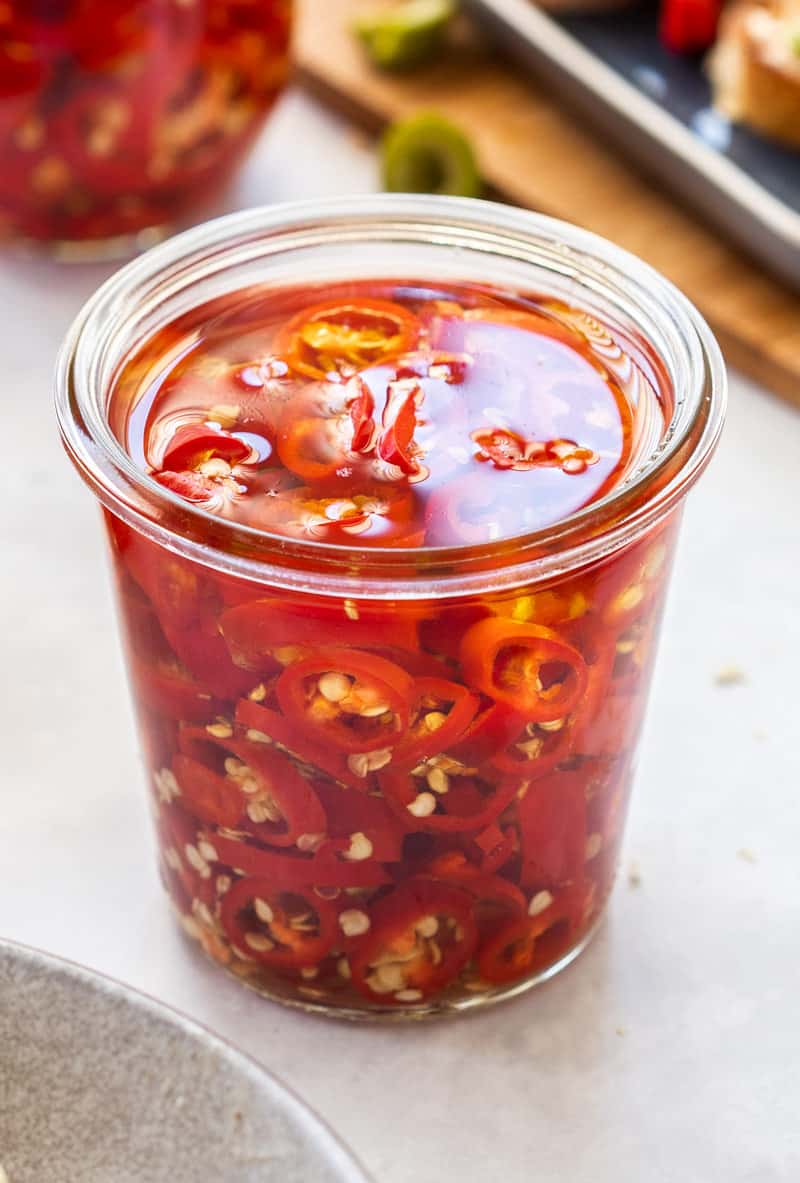
Safety precautions:
To prevent bacteria and the growth of botulism in vegetables, herbs or spices which are packed in oil, the CSIRO (Commonwealth Scientific and Industrial Research Organisation) in Australia has provided advice for commercially produced vegetables in oil. They must not have a pH greater than 4.6. This “can be achieved only by adding acid to the vegetable material”.
For this reason, we soak the sliced chillies in vinegar and salt for a minimum of 24 hours prior to bottling in oil to increase their acidity.
The jar in which the chillies are stored must be sterilised and I have given instructions in the recipe notes.
I store the chillies in a cool, dark location and have kept them for 2-3 months although generally I prefer to make small batches that are consumed within a few weeks. If you prefer, you can keep them in the refrigerator, but the oil will solidify and become cloudy. It does not look attractive but as the oil reaches room temperature it will again become liquid.
When removing chillies from the jar it is important to always use clean utensils.
We have had two batches of our chillies tested by a Government food testing laboratory. The first batch was two days old and registered a pH of 3.21 and the second batch was three months old and registered a pH of 3.28.
I suggest that if you are intending to make the chillies and would like to check their pH you could invest in a pH testing kit.
When it comes to serving:
This recipe for Preserved Chillies in Oil will enable you to enjoy their spiciness – it is an easily prepared condiment which is a great addition to many dishes.
I place a bowl of these Preserved Chillies in Oil on the table for many meals. They are delicious served with pizza, pasta, salads, meat, poultry or vegetables.
I serve them with my Greek Chicken and Salsa and Mediterranean Beef Stew, to name a few!
In fact, I have even been known to add them to my breakfast toast with tomato or mashed avocado.
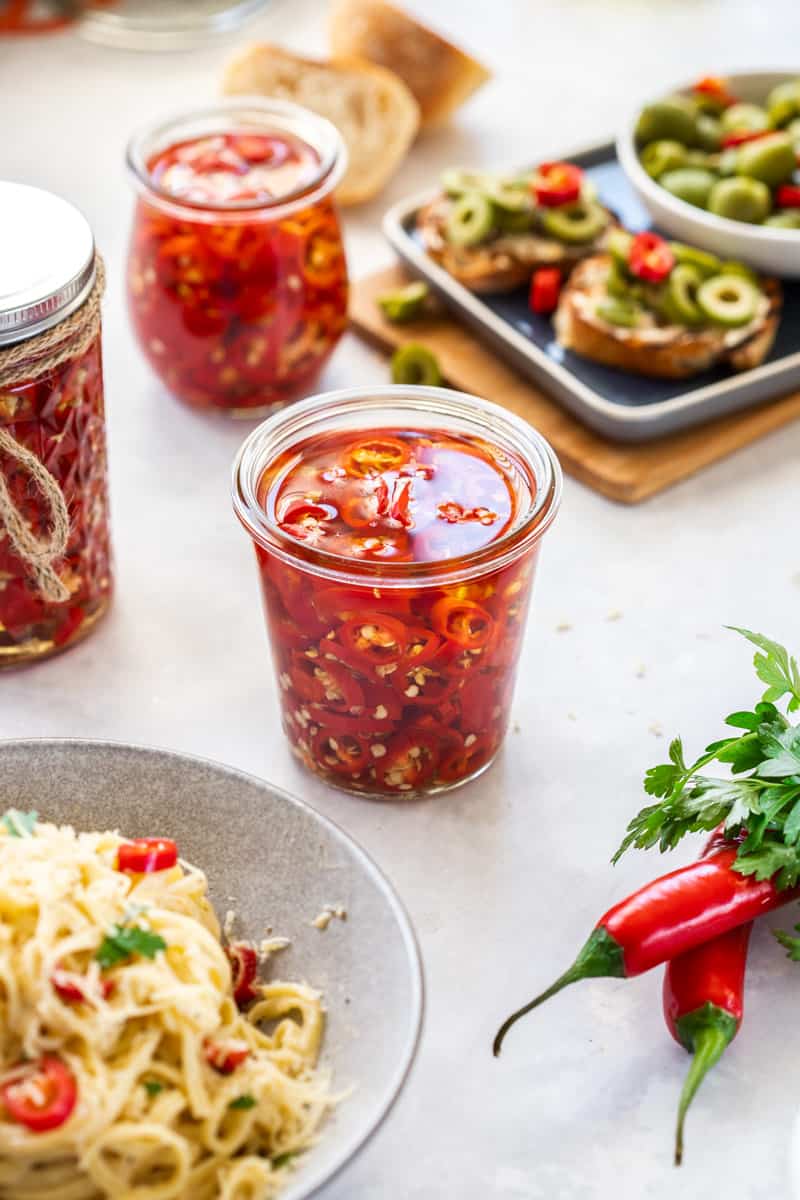
More delicious recipes for you to try:
We love to use long red chillies in our cooking. You’ll find some more recipes featuring them here:
- Sweet Chilli Sauce
- Red Chilli Paste
- Roasted Mediterranean Olives
- Baked Feta with Olives and Rosemary
- Mushroom San Choy Bow
Homemade preserves, such as our Preserved Chillies in Oil, make a fantastic edible gift – here are some more of our favourite ideas:
- Homemade Pickled Jalapenos
- Bread and Butter Cucumber Pickles
- Japanese Pickled Ginger (Gari)
- Spicy Cucumber Pickles
- Pickled Daikon
- Beetroot Pickled Turnips
- Dill Pickled Cucumbers
Enjoy these delicious Preserved Chillies in Oil. I would love to know what you think in the comments below!
Alex xx
This post was originally published in September 2018. It has been updated with new photos and more information. The recipe remains the same.
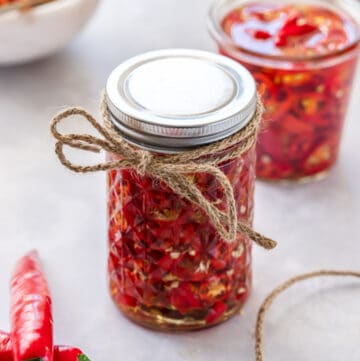
Preserved Chillies in Oil
Recipe Measurements:
For accuracy, when weights are provided, we recommend weighing your ingredients. This will produce the best results.
Ingredients
- 200 gm (7 ounces) long red (cayenne) chillies See Notes 1 and 2
- 1 ½ tablespoon (30 g) coarse cooking salt See Notes 3 and 4
- 1 ½ cups (375 ml) white vinegar (5% acidity) See Note 5
- 1 cup (250 ml) extra virgin olive oil See Note 6
Instructions
To Sterilise the Jars:
- Choose glass jars with an airtight, metal lid and ensure they have been washed in the dishwasher or by hand in hot soapy water then rinsed well. Check that the metal lids do not have rubber inserts – if they do, allow them to air dry instead of placing in the oven.Preheat the oven to 130 Degrees C (270 F). Place the jars and lids on a baking tray. Heat in the oven for at least 20 minutes, then remove and allow to cool before filling.
To Prepare the Chillies:
- To begin, carefully wash and thoroughly dry the chillies. Then, remove the stalks and finely slice the chillies, seeds included. Do not use any which have blemishes or bruises.
- I recommend that you wear food-safe, disposable gloves when handling the chillies. Avoid touching your face or eyes as the active ingredient, capsaicin, can irritate the skin and cause burning. After cutting the chillies, discard your used gloves and carefully wash your cutting board and knife.
- In a non-reactive glass or ceramic bowl, (see Note 7), prepare a vinegar and salt brine. Combine the two ingredients and stir them well. Add the chillies along with their seeds. Ensure that they are covered with the brine, adding more if necessary, using a ratio of 1 tablespoon of salt for each cup of vinegar.
- Stir the chillies then cover them with cling wrap and set them aside in their vinegar and salt bath for a minimum of 24 hours. Stir once or twice during this time. This process removes some of their moisture, increases acidity and assists with the preservation. (See Note 8)
- After that time, drain the chillies well in a fine sieve, discard the vinegar, pack the chillies into the sterilised jar (see Note 9) and completely cover with olive oil. There will be some air pockets; wait until the oil has settled, you may need to add a little extra.
- Store the chillies in a cool, dark place. The chillies will last for about 3 months, but are best consumed within the first 2 as they soften in texture the longer they sit in the oil.Alternatively, you may prefer to store them in the refrigerator. The olive oil will solidify and become cloudy but will become liquid again when the chillies return to room temperature. For this reason, some readers have used another oil but we prefer the taste of olive oil. Always use clean utensils when removing the chillies from the oil.
Video
Notes
- This is the weight of the chillies after the stems have been removed. This is a flexible recipe and can be made to a smaller quantity. Just use the ratio of 20 gm of salt to 1 cup of vinegar for the brine.
- I find that cayenne chillies generally have a mild heat. When I want to increase the heat I add a few of the small, red, very hot chillies.
- Use coarse kitchen salt, or Kosher salt. Do not use table salt; it is finer and the chillies will become too salty.
- The Australian tablespoon is 20 ml or 4 teaspoons. In many other countries the tablespoon is 15 ml or 3 teaspoons. You may have to adjust the measurements accordingly.
- You can use distilled white vinegar or white wine vinegar. They each will have an acidity content of around 5%. For this recipe, we do not recommend apple cider vinegar as it has a lower acidity level. Do not use vinegar which is specifically sold for cleaning purposes; it has a much higher acidity content and is not intended for culinary purposes.
- Always ensure there is sufficient oil to cover the chillies. For 200 gm chillies, and the container in which I stored them, I used 1 cup of oil. Depending on the container, you may need to use a little more.
- Acidic ingredients, such as vinegar, may react with bowls made from aluminium, copper or iron, causing the ingredients to discolour and possibly take on a metallic taste.
- On occasion, for the sake of convenience, I have left the chillies in their brine for more than 24 hours without ill effect.
- To prevent the growth of bacteria, it is essential that the jar be properly sterilised and always use clean utensils when removing chillies from the jar.
- Please note, the nutritional information is based on the entire jar (including the oil). The nutritional information is an estimate only.
Nutrition Estimate:
Nutritional Disclaimer:
The nutritional information is an estimate only, and is derived from online calculators. For accurate results, we recommend calculating the nutritional information based on the ingredients and brands you use.
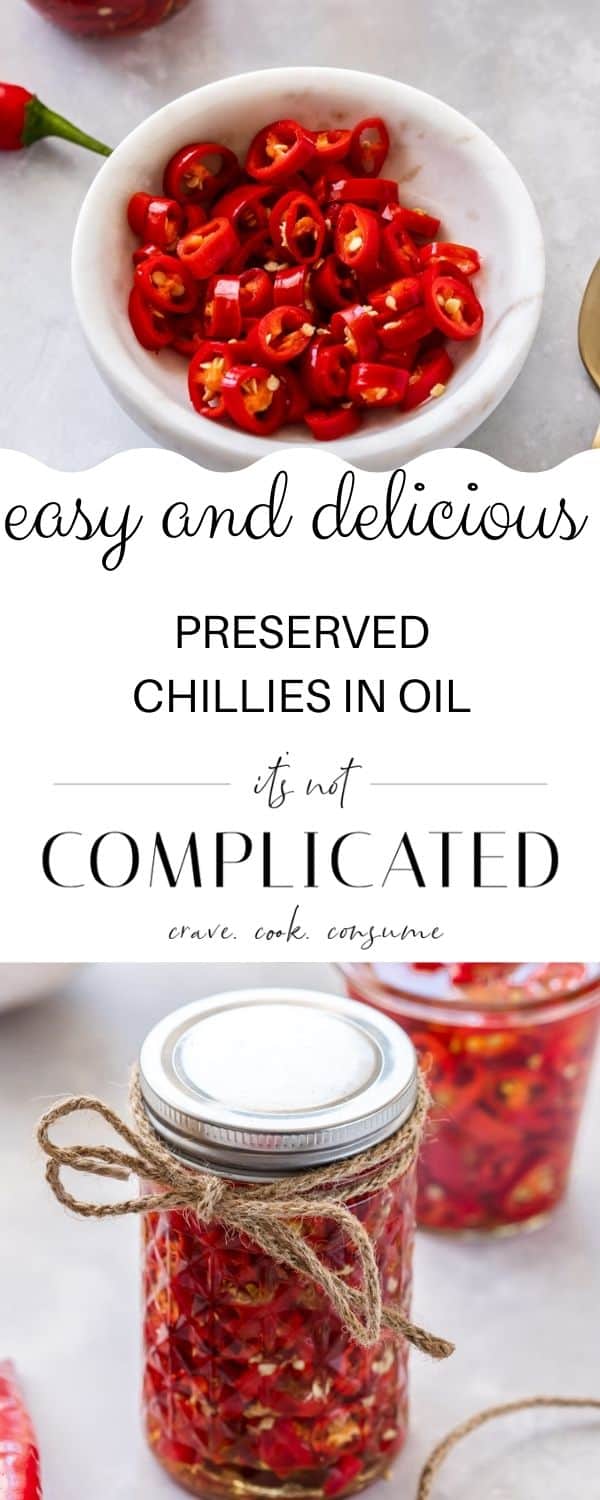


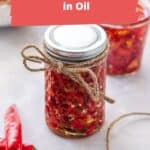
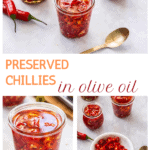


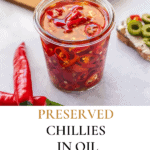

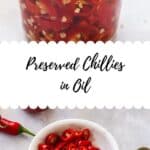
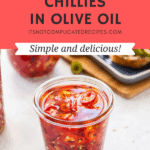
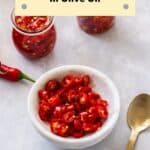





Leave a Comment